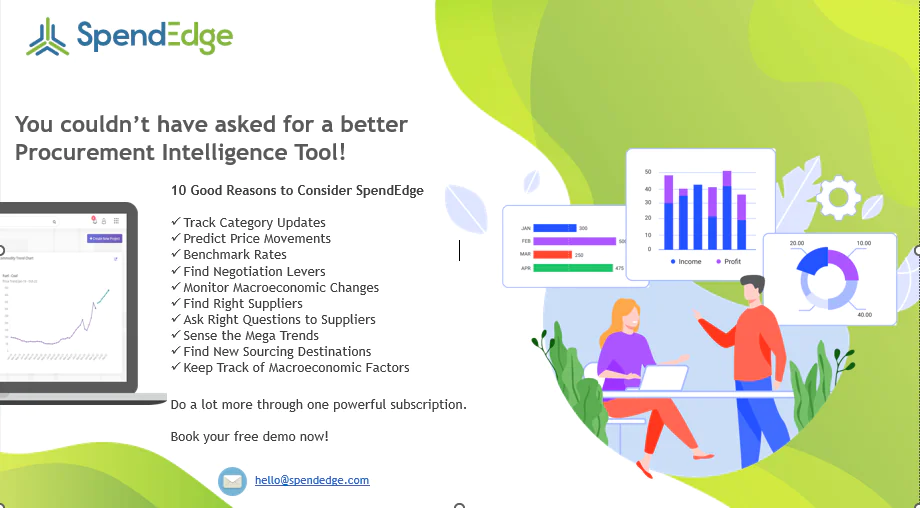Author: Vice President, Marketing Strategy, SpendEdge
Overview
Today, the pharmaceutical industry players are shifting towards product innovations to compete with their counterparts in terms of stable growth, healthy margins, and retain their value in the market space. Leading pharmaceutical companies are devising the need for strategic category management solutions to increase performance and reduce costs. Also, organizations advocate for category management to identify and evaluate suppliers and prioritize actions to manage the marketing spend proactively. Furthermore, category management helps companies analyze customers’ reach and devise effective global consumer marketing strategies.
Success Story
The Procurement Pain Point and Insights Offered
A renowned pharmaceutical company was facing predicaments in developing effective strategic sourcing solutions. The client wanted to understand the price trends and fluctuations prevailing in the pharmaceutical space, the latest trends and opportunities, and get an accurate price forecast for the products offered.
Solutioning
To understand the latest developments in the market space, the client approached SpendEdge’s category management team. The team of experts at SpendEdge carried out extensive research, comprising interviews and discussions with leading stakeholders in the pharma industry. The team also compiled information from various proprietary sources, such as paid industry databases, company presentations, and newsletters. Considering various factors influencing the growth of the pharmaceutical industry, SpendEdge’s category management solution helped the client identify new product and service launches in the industry, giving directions to the client on the products that align with pricing objectives, seasonal trend, and consumer demand. The solution includes strategic positioning of the products to meet customer demands while optimizing sales performance. The solution further helped the client accurately forecast pricing trends and understand their potential impact on the costs of material sourcing.
With years of expertise in offering many services, SpendEdge’s category management solution aided the businesses evaluate the current state of their purchasing practice. With the help of category management, the client further streamlined their source goods and services, supplier selection, and understand internal stakeholder activities and requirements. SpendEdge’s procurement solutions also assisted the client in accurately monitoring market and supplier development and developing proactive market strategies.
Business Outcome
The category management solution helped the client focus on strategic category initiatives and ensure improved stakeholder management. The client also implemented an effective pricing strategy and better-managed category risks and supplier relationships.
Category Management in Pharma
Category management organizes and manages procurement spending effectively across various categories, enhances supplier relationships, and maintains approved quality standards. This approach is vital for pharma companies aiming to optimize their supply chain and procurement cycles.
Pharma companies benefit from category management by implementing a structured procurement method, which helps maintain a seamless procurement cycle. This includes monitoring supplier performance, fostering solid relationships to ensure a steady flow of pharmaceuticals meeting approved quality standards, and ensuring that the right pharmaceutical products are sourced efficiently and cost-effectively. Companies can enhance their overall procurement efficiency by focusing on supplier relationships, categorizing products, and implementing robust procurement methods.
Key Reasons to Invest Resources in Category Management
Improved Customer Experience:
Effective category management helps businesses tailor their product offerings to meet their target customers' specific needs and preferences. By organizing products in a logical and customer-centric manner, businesses can enhance the shopping experience.
Increased Sales and Revenue:
By understanding customer preferences and optimizing product assortment, pricing, and placement, businesses can encourage more significant purchases, cross-selling, and upselling opportunities.
Optimized Inventory and Supply Chain:
Category management ensures that inventory levels are aligned with customer demand. This prevents overstocking and understocking issues, which can lead to cost inefficiencies and missed sales opportunities.
Effective Promotions and Marketing:
A well-organized category structure allows businesses to plan and execute targeted promotions and marketing campaigns, leading to more effective use of promotional resources.
Data-Driven Decision Making:
Category management relies on data analysis to understand customer behavior, market trends, and product performance. This data-driven approach enables businesses to make informed product assortment, pricing, and inventory management decisions.
Conclusion
Category management is essential in the pharmaceutical industry to ensure effective strategies in sourcing and delivering correct medicines. By employing a structured procurement method, pharma companies can streamline their procurement cycle, improve supplier performance, and optimize procurement spending. Category management allows for precise categorizing of pharmaceuticals, enhancing supply chain data analysis and supply chain risk management. This strategic approach supports the standardizing of procurement procedures and empowers category executives to drive procurement optimization. Ultimately, category management is pivotal for maintaining a resilient and efficient pharmaceutical supply chain.





